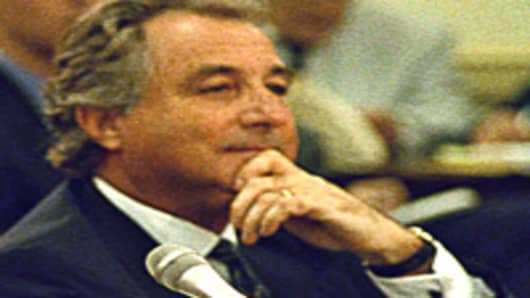Securities and Exchange Commission Chairman Christopher Cox has asked the agency's inspector general to investigate the SEC's conduct with regard to the alleged Ponzi-scheme linked to money manager Bernard Madoff, CNBC has learned.
In a statement issued by the SEC, Cox said the review would "cover the internal policies at the SEC governing when allegations such as those in this case should be raised to the Commission level, whether those policies were followed, and whether improvements to those policies are necessary."
The investigation will also include all staff contact and relationships with the Madoff family and firm, and their impact, if any, on decisions by SEC staff regarding the firm.
The Inspector General's office declined to comment on the request, which is expected to come as soon as today.
The inspector general, David Kotz, has issued a number of reports in recent months critical of the agency for being too close to entities it regulates. (See more below.)
The 70-year-old Madoff (pronounced MAY-doff), well respected in the investment community after serving as chairman of the Nasdaq Stock Market, was arrested last week in what prosecutors say was a $50 billion scheme to defraud investors.
Should the Inspector General decide to investigate, it would become one of a number of probes taking shape in Washington into whether the SEC gave any sort of preferential treatment to Madoff's firm.
Senate Banking Committee Chairman Christopher Dodd has already reportedly asked the SEC for information regarding the scandal. The ranking Republican on the Senate Finance Committee, Charles Grassley of Iowa, has been sharply critical of the agency—especially in light of the recent Inspector General reports—and could also jump into the fray.
More From CNBC.com
- Restoring Trust: Watching Wall Street in 2009
- Cramer: This Game Is Rigged
- Slideshow: Notable Sex Scandals
Among the key questions facing the agency: why the Madoff firm was not examined by the agency after it became a registered investment advisor in 2006, and why earlier inquiries into Madoff's operations did not turn up the alleged scam.
Madoff's alleged victims include the family charitable foundation for Sen. Frank Lautenberg, D-N.J.; a charitable trust tied to real estate magnate Mortimer Zuckerman; and a charity of movie director Steven Spielberg.
The Wall Street Journal reported DreamWorks Animation SKG Chief Executive Jeffrey Katzenberg and the foundation of Nobel laureate Elie Wiesel also took hits.
As the scale of the alleged scheme was realized, attention turned quickly to Madoff's connections to Washington regulators responsible for monitoring investment funds like the one Madoff operated.
For Investors:
- For After-Hours Dow 30 Quotes, Click Here
He knew everyone, former SEC chairman Arthur Levitt said in an interview with The Associated Press. Levitt said he did not invest any money with Madoff.
The director for enforcement at the SEC, Linda Thomsen, said the government was working with federal prosecutors and the FBI to understand the case, "to pursue the case we've got, to preserve assets to the extent we were able and to bring everyone who was responsible for the conduct at the Madoff firm."
At one SEC hearing in April 2004—during the period when Madoff is accused of carrying out his $50 billion fraud—Madoff joked with then-commission chairman William Donaldson about Madoff's own extraordinary profits and teased that he wasn't inclined to provide any advice that might help his business rivals.
"Our firm has made a fairly decent living as a fast market competing with a slow market," Madoff said, "so I'm not sure it's in our own best interest for everyone to become a fast market."
Video: Madoff asks for more time to find signees for his $10 million bond.
Commissioners laughed openly as Madoff agreed "to take off our selfish hats here and speak for the public good."
As a former Nasdaq chairman, Madoff was an expert sought by Washington regulators who asked for advice on any number of regulatory issues over the years.
In 2000, Madoff served on the government's Advisory Committee on Market Information, established to protect investors by ensuring accurate and full public disclosure of information to them.
Financial analysts raised concerns about Madoff's practices repeatedly over the past decade, including one letter to the SEC as early as 1999 that accused Madoff of running a Ponzi scheme, but the agency did not conduct even a routine examination of the investment business until last week, The Washington Post reported on its Web site Monday night.
Inspector General Has Cited Lax Enforcement
Questions have been raised in two earlier cases about the SEC's handling of investigations involving influential figures on Wall Street or powerful investment firms.
Inspector General Kotz, in a report issued this fall, said there were "serious questions" about the impartiality and fairness of the SEC's insider-trading investigation in 2004 and 2005 of hedge fund Pequot Capital Management.
A former SEC attorney who worked on the probe and was fired by the agency told Congress he was blocked by agency superiors when he tried to question John Mack, now chairman of the Morgan Stanley investment house. The SEC took no enforcement action in the Pequot case. The hedge fund and Mack have denied any wrongdoing.
In another report, Kotz determined the head of the SEC's Miami office failed to properly enforce securities laws in the investigation of now-defunct Bear Stearns' pricing of complex investments it sold, and found that he shouldn't have closed the inquiry in the summer of 2007 without enforcement action.
Bear Stearns nearly collapsed into bankruptcy in March and was purchased by rival JPMorgan Chase with a $29 billion federal backstop.
Last month, an administrative law judge at the SEC rejected Kotz's conclusions and his recommendation for disciplinary action against Thomsen, the agency's enforcement director, and two other officials in the matters.
The judge, Brenda Murray, wasn't acting in her capacity as an administrative law judge but rather as an SEC official asked by the agency's executive director to assess the inspector general's findings.
- AP contributed to this report.




